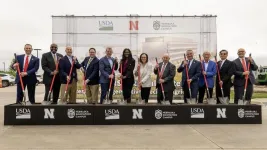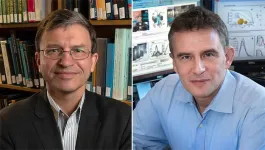(Press-News.org) In a fast-paced digital age where patients can open their test results as soon as they are available, what happens when a patient reads through complicated results without a physician there to help them understand what it all means? And what happens when a patient misinterprets bad news as good news, or vice versa?
It’s a scenario Benjamin Vipler, MD, confronted after his mom received her colonoscopy results on her health system’s patient portal. Like many patients, she opened up her results before meeting with her clinician and tried to decipher the medical jargon. Thinking the results showed she was cancer free, she shared the good news with her son, who is an assistant professor in the Division of Hospital Medicine at the University of Colorado Department of Medicine. But when she subsequently asked him what lymphoma meant, Vipler discovered she had misinterpreted results which actually indicated she had cancer.
The experience prompted Vipler to contemplate the impact of the 21st Century Cures Act, a federal law that requires the immediate electronic release of all patient results and documents without delay. The law is intended to empower patients with their health information, but as Vipler has witnessed, it can also have unintentional consequences for patients and clinicians alike.
Hoping to encourage further studies on the law’s impact and promote discussion on how the current system can improve, Vipler wrote a Perspective article, called “‘What’s Lymphoma?’ — Risks Posed by Immediate Release of Test Results to Patients,” which the New England Journal of Medicine published on March 16.
We asked Vipler to discuss his concerns, suggestions for improving patient care, and the need for further research.
The following interview has been edited and condensed.
Q: What prompted you to write this Perspective article?
This actually was not my mom’s first experience with a cancer diagnosis, but the first happened before the Cures Act. The experience that she had then, compared to after the law was enacted, was night and day. That was one of my reasons for writing this article. Seeing a potentially empowering piece of legislation have a negative outcome was really disheartening, and I hope that we can find fixes.
On the primary care side, I’ve had experiences where patients got their results before I had the chance to review them, and they essentially did their own Google searches on whatever their new diagnosis was.
So, I've always been interested in this because it's definitely a shift in how we practice medicine. The fact that it hit so close to home made me want to share it even more.
Q: In the article, you said the Cures Act was designed, in part, “to foster patient-centeredness” and “increase timeliness of result notification.” In practice, what do you think are the main risks of immediately releasing test results to patients?
There are a lot of upsides to the Cures Act, but a downside is that it assumes patients have a certain degree of medical understanding and health literacy. This assumption has the potential to make the immediate release of lab results an inequitable process. It also assumes that if someone doesn't understand something, they'll go to their clinician as opposed to going to other resources that are not well-vetted — which may not always be the case.
Q: You cited research that suggested a majority of patients prefer to receive test results immediately over a patient portal. Why do you think most patients prefer the immediate test results?
Knowledge can be power. I think giving patients their results and putting some of the ownership of their health care on them can be very impactful and very powerful, if used correctly.
Regarding the Cures Act, I'm not necessarily saying there should be a repeal or policy change. When you have large numbers of patients who prefer to have their results immediately released, maybe that is the best thing for patients and health care. But we shouldn't forget the minority of patients who don't just because they are in the minority.
Q: In the article, you wrote that, “Many clinicians now feel they must race to convey results before their patients read them.” How does the immediate release of test results impact clinicians?
I think one of the complications that can arise is if the patients’ research on an abnormality in their results leads them to thinking they have a prognosis or a diagnosis that is worse than what the abnormality actually means.
Also, having to provide reassurance to patients when the "cat is already out of the bag" can be a big challenge. There is a way that we are trained to convey bad news and it’s a multi-step process. This new process of delivery sort of circumvents that tried-and-true method. And I think there may be some moral injury or personal distress if a patient receives bad news in a way other than the way we were trained to give bad news.
Q: Throughout your article, you mentioned ways the current system of delivering test results can improve. What are some of those suggestions?
Many if the lab results patients receive that we’re most unprepared for are either incidental findings or things that we weren’t necessarily expecting when we ordered a test. And those can be the most challenging because it may not come up in the clinic visit before you order the test. If you’re ordering a test that will either have one outcome or another, you can walk the patient through those potential outcomes ahead of time. But if you’re getting a scan of the patient’s belly, there is a lot that you could find in there. In those cases, I think being very transparent with patients that there are these potential “unknown unknowns” is really important.
Another thing that we can do is give plain language statements in our lab reports, radiology reports, or pathology reports that patients can read when they get immediate access to them.
Finally, we can counsel about whether or not patients should be checking or should be getting alerts as soon as their results drop. If patients do not want to receive their results immediately, they should probably turn off the notifications.
Q: You said it is too soon to understand the full implications of the Cures Act. What additional research do you think needs to be done?
There is a lot of ongoing, good research on the Cures Act, and some of that was done out of our own university. Much of the research right now is on patient experience. I think that if the act had goals of empowerment and improvement in health outcomes, we also need to study that.
Unfortunately, some of the literature says that we are not very good at following up on incidental, abnormal findings, given the fragmentation in health care. I think if we can show that giving patients their results in real time leads to fewer missed follow-up appointments and results, having that data could really support the potential benefits of the Cures Act.
END
CU Department of Medicine doctor discusses unintended consequences of patients having immediate access to test results
Benjamin Vipler, MD, looked at the impact of the 21st Century Cures Act on patients and clinicians in his recently published article in the New England Journal of Medicine
2024-05-07
ELSE PRESS RELEASES FROM THIS DATE:
More feelings of misinformation, more news avoidance, U-M study shows
2024-05-07
As people have more difficulty distinguishing fact from fiction in the United States, they are more likely to feel news fatigue and avoid news altogether, according to a University of Michigan study.
More than an unintentional avoidance because of lack of media exposure, the researchers say people actively avoid news.
The researchers also find that people who identify as strong Democrats begin relying more on nonpartisan news media when feeling misinformed, while people who identify as strong Republicans report using less news media overall, including less conservative news media. Their results are published in Journalism Studies.
"The more confusing ...
Ochsner Health named to Newsweek’s America’s Greatest Workplaces 2024 for Mental Wellbeing
2024-05-07
NEW ORLEANS, La. – Ochsner Health, a leader in patient care, research and education, has been named one of America’s Greatest Workplaces for Mental Wellbeing 2024 by Newsweek and Plant-A Insights Group. The ranking survey conducted included responses from more than 250,000 young professionals and more than 1.5 million company reviews.
Ochsner Health is committed to fostering an environment that prioritizes the mental well-being of each employee through innovative health initiatives, comprehensive support services and a culture ...
Professor emeritus John (Jack) Johnson elected to the National Academy of Sciences
2024-05-07
LA JOLLA, CA—Scripps Research professor emeritus John Johnson, PhD, has been elected to the National Academy of Sciences—one of the highest honors given to scientists. According to the Academy, members are selected “in recognition of their distinguished and continuing achievements in original research.”
“Becoming a member of the Academy is a great honor for me and the 70 graduate students and post docs that have worked in my lab since 1978, as well as numerous collaborators at Scripps and around the world,” says Johnson, who is also the Eldon R. Strahm Professor of Structural Virology in the Department of Integrative Structural ...
University of Nebraska-Lincoln, USDA partner on ground-breaking precision ag research center
2024-05-07
Construction of the National Center for Resilient and Regenerative Precision Agriculture at Nebraska Innovation Campus launched with a ceremonial turning of dirt on May 6.
The state-of-the-art research center is a partnership between the U.S. Department of Agriculture’s Agricultural Research Service, University of Nebraska–Lincoln and Nebraska Innovation Campus. The center will focus on the challenges and opportunities in agricultural innovation for the 21st century.
“There is a long history of scientific innovation and collaboration between ARS and UNL, typical of the USDA-land-grant ...
Two Brookhaven lab scientists named AAAS Fellows
2024-05-07
UPTON, N.Y. — The American Association for the Advancement of Science (AAAS) has recognized two staff scientists from the U.S. Department of Energy’s (DOE) Brookhaven National Laboratory with the distinction of Fellow: Deputy Associate Laboratory Director for High Energy Physics Dmitri Denisov and Senior Chemist Anatoly Frenkel. Each year, AAAS bestows this honor on select members whose “efforts on behalf of the advancement of science, or its applications, are scientifically or socially distinguished.” Marking the 150th anniversary of the program, new fellows ...
Chimps learn and improve tool-using skills even as adults
2024-05-07
Chimpanzees continue to learn and hone their skills well into adulthood, a capacity that might be essential for the evolution of complex and varied tool use, according to a study publishing May 7th in the open-access journal PLOS Biology by Mathieu Malherbe of the Institute of Cognitive Sciences, France and colleagues.
Humans have the capacity to continue learning throughout our entire lifespan. It has been hypothesized that this ability is responsible for the extraordinary flexibility with which humans use tools, a key factor in the evolution of human cognition and culture. ...
AI predicts tumor-killing cells with high accuracy
2024-05-07
MAY 7, 2024, NEW YORK – Using artificial intelligence, Ludwig Cancer Research scientists have developed a powerful predictive model for identifying the most potent cancer killing immune cells for use in cancer immunotherapies.
Combined with additional algorithms, the predictive model, described in the current issue of the journal Nature Biotechnology, can be applied to personalized cancer treatments that tailor therapy to the unique cellular makeup of each patient's tumors.
“The implementation of artificial intelligence in cellular therapy is new and may be a game-changer, offering new clinical options to patients,” said Ludwig Lausanne’s Alexandre ...
Study provides comprehensive analysis of Rhode Island’s unregulated drug supply
2024-05-07
PROVIDENCE, R.I. [Brown University] — A new analysis revealed the frequency of potentially lethal substances, such as fentanyl and xylazine, in counterfeit pills that had been circulating in Rhode Island’s illicit drug supply.
Study author Dr. Rachel Wightman, an associate professor of epidemiology and emergency medicine at Brown University, said the analysis provides important information about the composition of counterfeit pills, which are designed to replicate legitimate pharmaceutical pills but often lead to adverse health effects.
“The level of detail found in our analysis can help inform treatment conversations and improve patient care,” ...
Biomarker found to help identify cells that can repair damaged blood vessels
2024-05-07
INDIANAPOLIS – Researchers have discovered a protein marker to help identify cells able to repopulate in patients with damaged blood vessels. Their findings, recently published in Circulation, could lead to new therapies for people with endothelial dysfunction, a type of disorder that contributes to coronary artery disease that may occlude with plaque and lack ability to carry sufficient blood into the heart tissue causing a heart attack.
“This study is the first to establish that a single, prospective marker identifies vascular clonal repopulating endothelial cells ...
Could getting enough sleep help prevent osteoporosis?
2024-05-07
As part of the University of Colorado Department of Medicine’s annual Research Day, held on April 23, faculty member Christine Swanson, MD, MCR, described her National Institutes of Health-funded clinical research on whether adequate sleep can help prevent osteoporosis.
“Osteoporosis can occur for many reasons such as hormonal changes, aging, and lifestyle factors,” said Swanson, an associate professor in the Division of Endocrinology, Metabolism, and Diabetes. “But some patients I ...
LAST 30 PRESS RELEASES:
When safety starts with a text message
CSIC develops an antibody that protects immune system cells in vitro from a dangerous hospital-acquired bacterium
New study challenges assumptions behind Africa’s Green Revolution efforts and calls for farmer-centered development models
Immune cells link lactation to long-lasting health
Evolution: Ancient mosquitoes developed a taste for early hominins
Pickleball players’ reported use of protective eyewear
Changes in organ donation after circulatory death in the US
Fertility preservation in people with cancer
A universal 'instruction manual' helps immune cells protect our organs
Fifteen-year results from SWOG S0016 trial suggest follicular lymphoma is curable
The breasts of a breastfeeding mother may protect a newborn from the cold – researchers offer a new perspective on breast evolution
More organ donations now come from people who die after their heart stops beating
How stepping into nature affects the brain
Study: Cancer’s clues in the bloodstream reveal the role androgen receptor alterations play in metastatic prostate cancer
FAU Harbor Branch awarded $900,000 for Gulf of America sea-level research
Terminal ileum intubation and biopsy in routine colonoscopy practice
Researchers find important clue to healthy heartbeats
Characteristic genomic and clinicopathologic landscape of DNA polymerase epsilon mutant colorectal adenocarcinomas
Start school later, sleep longer, learn better
Many nations underestimate greenhouse emissions from wastewater systems, but the lapse is fixable
The Lancet: New weight loss pill leads to greater blood sugar control and weight loss for people with diabetes than current oral GLP-1, phase 3 trial finds
Pediatric investigation study highlights two-way association between teen fitness and confidence
Researchers develop cognitive tool kit enabling early Alzheimer's detection in Mandarin Chinese
New book captures hidden toll of immigration enforcement on families
New record: Laser cuts bone deeper than before
Heart attack deaths rose between 2011 and 2022 among adults younger than age 55
Will melting glaciers slow climate change? A prevailing theory is on shaky ground
New treatment may dramatically improve survival for those with deadly brain cancer
Here we grow: chondrocytes’ behavior reveals novel targets for bone growth disorders
Leaping puddles create new rules for water physics
[Press-News.org] CU Department of Medicine doctor discusses unintended consequences of patients having immediate access to test resultsBenjamin Vipler, MD, looked at the impact of the 21st Century Cures Act on patients and clinicians in his recently published article in the New England Journal of Medicine




